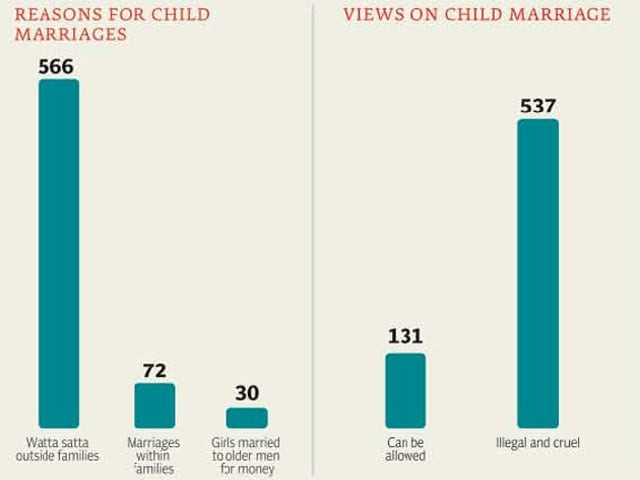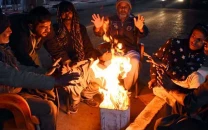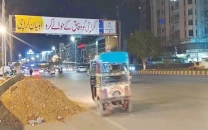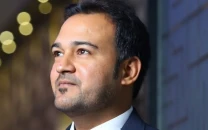Child marriages: Keeping it all in the family
Biggest reasons for child marriages is the system of exchange marriages, financial worries.

In a survey, 5,202 people from 668 families were asked to share their opinions on child marriages by the Sujag Sansar Organisation — an NGO working in Dadu - in collaboration with the Norwegian Human Rights Fund.
The survey was carried out in five villages in Dadu as a sample case for the entire province.
According to most families, one of the biggest reasons for child marriages is the system of exchange marriages or watta satta. Some families revealed that they are not allowed to marry outside their own families, so young boys and girls are forced to get married to older people. A few of the families revealed that they are compelled to marry off their young girls to very old men in exchange for money due to poverty.
Due to a lack of education and recreational facilities, elders also arrange the marriages of their boys at very young ages, hoping that this will keep them away from drugs and crime and bring them closer to family responsibilities.
While some families did not believe that underage marriages were wrong, most families felt that the practice was illegal and cruel and should not be allowed. Most families also said that the decision was made by either the fathers or the elders, while very few said that the women took the decision.
It was also revealed that very few couples are asked for their consent before marriage and that most nikahs are not even registered.
Social activists later met 19 journalists at a workshop to discuss the issue of reporting on child marriage. Most journalists complained that they face many difficulties while reporting on children’s and women’s rights. Moreover, journalists accused the police, bureaucracy and tribal chiefs of protecting the perpetrators of child marriages. Social activists said that they regret that people involved child marriages are hardily ever punished in lower courts due to a lack of proper investigations.
“Recently, a minor girl was declared an adult only on the basis of her physical appearance and her marriage was declared intact in a lower court on the basis of fake school certificates,” an electronic media reporter claimed, adding, “Due to the lengthy legal process, especially in the lower courts, the lives of the victims are destroyed while waiting for justice.”
Three child marriages took place in Johi alone during the recent floods but because the media was fully concentrated towards covering the floods, this news was not given any space in print and very little coverage in the electronic media, said another local electronic media reporter.
While some reporters do cover the issue, most cases of child marriages are poorly reported or not reported at all as they take place in rural areas where reporters are often unable to go and get firsthand information. Moreover, journalists often receive threats while covering such cases and are not offered much support or protection.
A journalist from Wahi Pandhi, Dadu, was killed one year ago because he had reported on a child marriage and had insisted on following the case. His family and friends have yet to be provided justice. Had his killers been apprehended and punished, other journalists would have found strength and courage to report on the issue and perpetrators would have been forced to think twice before harming any other journalist.
When contacted, a large number of nikahkhwans condemned the practice of child marriage. The Pakistan Family Act of 1961 states that girls cannot get married before the age of 16 years and boys must wait till they are 18 years old.
Gulsher Panhwer is a freelance writer who attended the workshop on child marriages
Published in The Express Tribune, November 20th, 2010.



















COMMENTS
Comments are moderated and generally will be posted if they are on-topic and not abusive.
For more information, please see our Comments FAQ